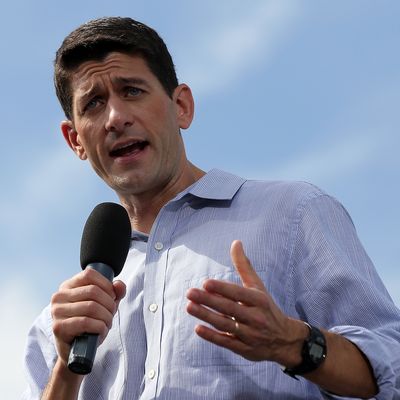
Paul Ryan’s most remarkable talent is an ability to communicate his intentions in such a way as to make political reporters certain of his genuineness. The normal rules of political reporting — analyzing a politician’s every word and deed as a political tactic — are suspended when Ryan is involved. I noticed this when, in the course of researching my Ryan profile, I found that reporters constantly described him as lacking political ambition, despite his precocious ascent. The same pattern can be seen in coverage of Ryan’s newfound interest in poverty, which is the the subject of McKay Coppins’s long reported piece today.
Ryan’s rebranding effort — sorry, his heartfelt interest — is inevitably described as “quiet.” Ryan “has spent the past year quietly touring impoverished communities across the country,” reports Coppins. A similar reported piece in National Review last June detailed “Ryan’s quiet pitch to the poor.” As did a Washington Post story last month(“Ryan … has been quietly visiting inner-city neighborhoods”). Coppin’s story quotes a skeptic, but adopts an almost perfect credulous tone.
It might seem odd that Ryan’s determination to keep his love of the poor quiet would nevertheless leak out in the media, over and over again. “Ryan has deliberately left the cameras behind during his excursions to poor neighborhoods this year in places like Indiana and New Jersey,” reports Coppins, “but the stories of his interactions with the poor somehow find a way of leaking into public view.” Somehow. The stories find a way. Because stories, far from being inanimate human creations, as you might think, actually have minds of their own and a willpower so fierce they can defy even the most secrecy-minded spinmeister.
Now, it’s impossible to disprove the suggestion that Ryan has grown obsessed with helping the poor. But what exactly does this mean? His entire career has been devoted to policies that would, as first-order effects, increase the incomes of the rich and decrease the incomes of the poor. Ryan has always argued that the first-order effects are less important than the deeper incentives he would unleash — cutting taxes for the rich and reducing subsidies for the poor will make both of them work harder. His signature vision-statement budget plans would impose massively disproportionate cuts on programs for the poor.
None of these articles about Ryan’s new poverty obsession say that he has changed any of these views. Indeed, Ryan continues to act politically like he always has. Despite massive unemployment, he wants to cut off unemployment insurance and reduce food stamps. He blocked a big budget deal, even one with major cuts to Social Security and Medicare, because he refuses to close any tax deductions for the affluent. At a speech last month, he said that poor people need religious salvation — a very old, very reactionary way of approaching the problem that also happens to be a useful rationalization for denying the poor any public financial support.
Probably Ryan thinks that mix of policies is great for the poor because it gives them the kick in the ass they need to stop being pathetic moochers and do something with their lives, and gives rich people the incentive they need to start new businesses to hire more of them. Presumably he will supplement his traditional right-wing policy mix with some new approach toward poverty. But is he conceding that his old/current policies hurt the poor? Or does he merely worry they gave the impression of hurting the poor?






























